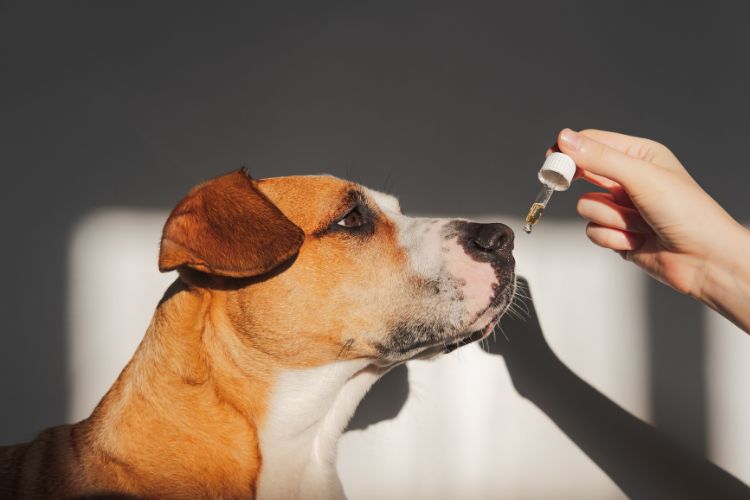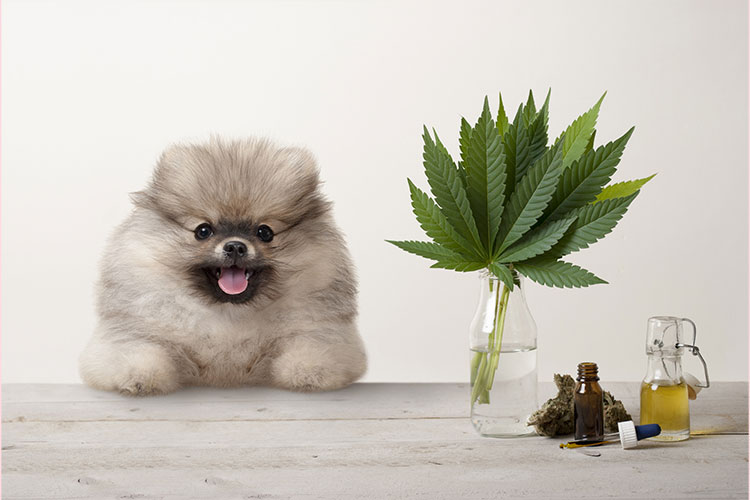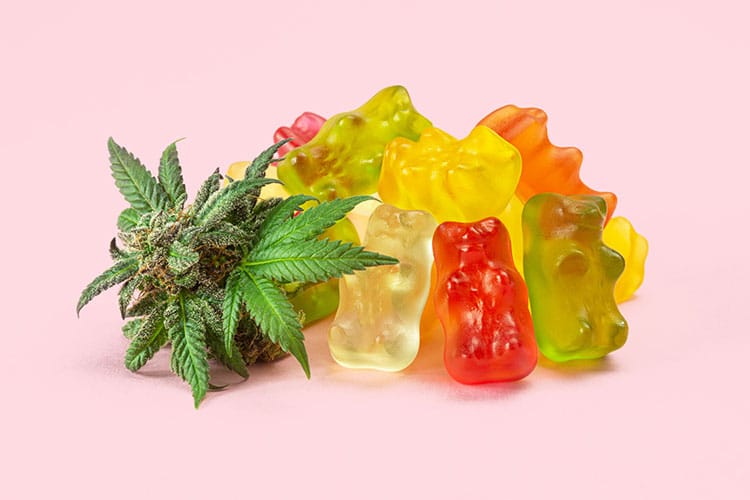Ever since CBD came crashing into the health industry, it’s popularity has risen at the speed of light. More uses for CBD have created a tidal wave of new products, and people love them.
But it’s not just people who are reaping the benefits of CBD. Other animals experience therapeutic benefits from CBD, like dogs and cats, and you can even find CBD for horses.
Housepets experience the same discomforts as humans. CBD can help people relax, so it makes sense that CBD works with dogs and cats, too.
How do we find the best CBD oil for our pets? In this article, we will show you how to spot high-quality CBD products and how to give them to your pet.
What Does CBD Do?
Cannabidiol (CBD) is a compound found in cannabis. CBD doesn’t get you high because it doesn’t contain THC. CBD is a great way for people to experience the health benefits of cannabis without putting THC into their bodies.
Pain relief is the most common use for CBD, but there are a lot of other benefits to using CBD oil. CBD can also:
- Reduce stress and anxiety
- Regulate appetite
- Create more alertness (only in smaller doses)
Other than its medical benefits, CBD is found in many cosmetic products. It’s a great natural supplement able to work on a variety of ailments and conditions.
The Endocannabinoid System In Pets: How Does It Work?
Pets like cats and dogs are mammals, just like humans, so it is not surprising that our pets’ endocannabinoid systems are similar to ours.
The endocannabinoid system is a system in the body that’s vital to a wide array of processes. It is important in processing pain, stress, appetite, sleep, and mood. It is also essential to the body’s immune and reproductive systems.
The endocannabinoid system has three important parts—receptors, endocannabinoids, and enzymes. The receptor cells reside all over the body. They are responsible for sending signals from the brain to other parts of the body.
The second component is the endocannabinoids themselves. These are molecules that send signals throughout the body.
The last component includes the enzymes. Their role is to break down the endocannabinoids and stimulate chemical reactions in the body.
Dogs have a higher number of cannabinoid receptors when compared to humans. More receptors mean that CBD will have more pronounced effects on dogs than on humans. Dogs are fundamentally more prone to the toxic effects of CBD.
Just as CBD has different effects on different people, CBD can have a range of effects upon different pets. Age, state of health, and body weight are also the main factors that may influence how CBD affects pets.
Are Human and Pet CBD Supplements Different?
The actual supplement is the same when it comes to humans and animals. The biggest difference is that certain manufacturers extract different amounts into their products to make them more suitable for their customers. That’s because of different factors like weight. A puppy would need far less CBD than a full-grown horse.
Can You Give Your CBD to Your Pets?
Though there’s nothing wrong with giving your pet human CBD, it’s not recommended. We do share the same benefits, and our bodies react almost the same. But, CBD for humans might be highly concentrated and not at a dose suitable for your pet.
You could also run into trouble because human CBD products aren’t designed for pets. When it comes to giving your pet CBD, always give them a product that was made for animals.
CBD Oil for Dogs
Dogs use more CBD than any other housepet. More dog owners are switching to CBD for dogs with pain, especially older dogs.
Here are some of the major benefits of CBD oil for dogs:
- Joint pain
- Separation anxiety
- Seizures or muscle spasms
- Irritations from allergies
- Recovery from illness
CBD Oil for Cats
Dogs aren’t the only housepets benefiting from CBD oil. Cats also share the same experiences as dogs when it comes to pain and stress. Many cat owners are looking into the best CBD for treating their cats with certain symptoms.
Please note that CBD does help cats deal with pain, but if you believe your cat’s condition to be quite serious, please bring them to the vet.
If not, CBD could be a great natural alternative medication to help your cat relax. It’s safe and has little known side effects, which we’ll discuss later.
CBD Oil for Horses
CBD seems to help a lot of mammals, but how about CBD for horses? Horses share the same benefits from CBD oil as do humans, cats, and dogs. Just like for other pets, it’s a safe alternative to other treatments.
Your horse could take CBD like any other vitamin. CBD oil will boost their immune system, help with chronic pain, and aid in indigestion.
However, CBD oil should be treated as a supplement for symptoms and never as a sole solution. If your horse is in serious condition, please bring them to an experienced vet.
Always check the packaging for instructions and recommended dose before giving CBD oil to your horse.
Is CBD safe for my pets?
Yes, CBD is safe for pets, based on a report published by the World Health Organization in 2017. Researchers found that pets using CBD exhibited an increase in alkaline phosphatase, or ALP, which is an enzyme found in the liver. The good news is that this increase in ALP did not affect the liver functions of the pets used in the research.
However, please keep reading to understand more before you feed or apply a CBD product to your pet.
One way to make sure that your pets are safe is by giving them products that are made specifically for them rather than for humans. This means that even though you may have CBD edibles, you should avoid giving them to your pets. These edibles may contain ingredients that can be harmful to animals.
Another simple way to ensure your pets’ safety is by looking for a Certificate of Analysis (COA) of the product you are buying. A COA is a document issued by Quality Assurance that is only given to products that meet stringent guidelines. If a product has this certificate, you can be sure that the product you are giving to your pet doesn’t contain anything that can harm them.
What Type of CBD Products Are There For Pets?
The beautiful thing about CBD is its diverse range of products. Depending on the needs of your pet, there is a wide selection from which to choose.
- Topicals – CBD topical creams are a great solution for dogs with itchy skin. It’s also a good product for dogs who suffer from allergies or fleas.
- Edibles– Edible is just a fancy word for products that are eaten. You can find CBD-containing dog treats. Treats are an effortless way to give your dog CBD because they taste delicious, and dogs love them.
- CBD oil – Similar to edibles, CBD oil is taken orally. Simply put a few drops onto your pet’s tongue, and they’re good to go.
- Pills/tablets – CBD pills are available for pets, too. You can add the correct dosage to their meal, then let the CBD digest and work its magic.
There are a ton of options for taking CBD. It’s important to know the needs of your pets to choose the right way to dose them. Some types of CBD work differently and have different effects in both humans and animals. It’s always a good idea to consult a vet before giving your pet any CBD products.
CBD is a new industry, even for humans. The possibilities are endless for both dogs and people. But with all of the options to choose from, how do you know which ones are legit?
High-Quality Only
When it comes to CBD oil, you always want to go with high-quality products. That’s because you can guarantee they are safe to use. The process used to extract CBD oil can make a huge difference in quality and safety.
Some processes use harmful material like butane to extract CBD. So, always do your research and check product reviews and the manufacturer’s information before giving them to your pets.
Be aware of CBD products that are improperly packaged or seem way too cheap. They are normally low quality and could potentially be dangerous for you or your furry little friend.
Always Check the Ingredients
Some CBD products contain other compounds like THC, which could intoxicate your pets. Although THC has its own benefits, it’s best to keep it away from animals. So, unless you want your pet to get stoned, it’s important to check the labels to see if there’s any THC present in the ingredient list.
Products with more quality ingredients will tend to cost more, but it’s worth the extra cash. Since CBD is mostly a therapeutic product, you always want to make sure it contains only the best ingredients.
If you’re giving your pet CBD edibles, make sure to check for other ingredients that could be harmful such as chocolate, nuts, or other preservatives. Most reputable companies have the full list of ingredients on their packaging, so make sure to read carefully.
With CBD use skyrocketing, there are a lot of online communities where you can find reviews of different CBD oils and products. It doesn’t hurt to ask the public for their experiences.
Pet owners are usually more than happy to share valuable information, and it helps grow the CBD industry.
What Are the Side Effects of CBD?
Though it has been declared safe, more research is underway on the potential side effects of CBD oil. You cannot overdose on CBD, but some negative side effects of CBD in dogs have been reported, including:
- Dry mouth
- Lowered blood pressure
- Drowsiness
Always start with smaller doses of CBD oil. CBD can be unsafe for pregnant women because of the potentially harmful materials used during production. That applies to pregnant pets, as well.
If your pet has a pre-existing condition or experiences severe side effects after using CBD oil, please contact your vet. Luckily, CBD has grown in popularity, and more doctors understand its effects and benefits.
What is the CBD Spectrum?
We all know CBD comes in many different shapes, sizes, and forms. If you’ve been shopping for CBD products already, you may have noticed some labels saying something like “Full Spectrum CBD” or “Broad Spectrum CBD.”
CBD fits into three categories:
- Full-spectrum CBD – contains all cannabis compounds, including THC (less than3%)
- Broad-spectrum CBD – contains the same compounds as full-spectrum, but without the THC
- CBD Isolate – pure crystallized CBD
Broad-spectrum CBD products are popular because they have the same benefits as the full-spectrum products, but the user doesn’t have to worry about ingesting THC.
CBD isolate is a more pure form of CBD, but it’s missing some great compounds that improve the benefits of CBD oil.
Always check the packaging to see what kind of CBD you have. Hopefully, now you will be better able to understand the labels.
Cost of CBD Oil
When it comes to CBD oil, you want to always aim for high-quality, which means more expensive products. But, you need to think about a few things before you start price shopping.
CBD is a supplement your pet may use daily, so while you don’t want to break the bank on it, you should place value on properly made CBD oil. Otherwise, you and your pet may have an unpleasant and potentially harmful experience.
Most high-quality oil will cost you about $30 a bottle. Depending on your dosage, a bottle should be last long enough to get your money’s worth.
How to choose the best CBD for your pets?
Choosing the best CBD for your pets entails a bit of research. It is safe to say that the use of CBD for pets is relatively new, do we don’t know everything its potential side effects.
That said, there are simple ways to ensure that the CBD product you are buying for your pets is the best quality available for them.
We’ve already mentioned the importance of a Certificate of Analysis when buying a CBD product for your pet. It gives you an idea of what ingredients the product contains and how they might affect your pets. If you see an ingredient or component that you are not familiar with, look it up online so you can decide if you want to give it to your pet. Think of it as looking at the nutritional value of any food that you are buying for yourself.
Another important consideration when choosing a CBD pet product is dosage. The effects of CBD differ from one pet to another. Choose something with a low dosage and gradually work your way to a higher dosage as your pet gets used to it.
If you have a veterinarian, feel free to get a professional opinion. Your vet knows everything there is about your pets’ state of health and how a CBD product may or may not benefit them. However, not all vets have experience with CBD pet products.
CBD Oil Laws
The acceptance of cannabis is growing all over the United States. More states are realizing the health benefits of CBD and moving the needle on legalization.
So is CBD legal all over the US? It really depends on the kind of CBD you have. Any CBD products extracted from hemp (no THC) are federally legal. If your CBD oil contains any THC, you will need to look at your local state CBD laws.
Do veterinarians prescribe CBD for pets?
No, veterinarians cannot prescribe CBD for pets. This is because, on the federal level, CBD is a Schedule 1 controlled substance as per the Drug Enforcement Administration—the same category that contains heroin.
Veterinarians are also not allowed to Introduce a discussion about CBD pet products with pet owners. The good news is that a workaround exists for this restriction. Your vet can discuss CBD pet products or their effects upon your pet only if you ask them about it. You need to be the one to start the conversation about CBD for your pets.
Can You Fly With CBD?
Once again, it depends. If you’re treating your pet with CBD, be aware of the laws in different states when taking your pet along. It’s legal to carry CBD products without THC across state lines, but it’s still tricky. Fortunately, more regulations and awareness are making it easier for people to take their CBD on the go.
However, if you want to pack CBD oil in your flight bag, you must do your research. Check your product to see if there’s any THC content. If so, check the local state laws of your destination before leaving.
Is CBD Better Than Hemp Oil For My Pet?
Just like CBD, hemp oil doesn’t contain any THC. That makes it a great product right off that bat because it’s federally legal. But you should know the difference between CBD and hemp oil for your pets.
Hemp oil also comes from hemp, which is in the cannabis family. Though they share similar benefits, hemp oil is considered more of a nutritional supplement. If your pet is in pain or is experiencing anxiety, CBD oil will be a better treatment than hemp oil.
That’s not to say that pets can’t benefit from hemp oil. It can be a great supplement to help boost their digestive system.
Just like with CBD, always speak with your vet before giving hemp oil to your pet.
Conclusion
Understanding everything about CBD can be a little intense and confusing because there are always new products. Humans are getting a good grip on how to take CBD. Now, our pets are enjoying the ride, too.
We aren’t sure where the popularity of these products will go, but we can be sure that more animals will be using CBD soon. It’s no doubt that CBD is a safer alternative to regular medication, and your pet can take it in many ways.
To recap, here are the key points to remember:
- Always speak with your vet before giving CBD oil to your pets.
- Though it’s been declared safe, always research the recommended dosage for your pet, and start with small doses.
- Only buy CBD oil from reputable sources and check their online reviews. Never use CBD oil that isn’t packaged properly or that seems cheaply made or packaged.
We hope you now have a solid understanding of the best CBD oil for pets, and you and your pets have an enjoyable experience.
FAQs About CBD For Pets
Question: How does our pets’ endocannabinoid system work?
Answer: Pets like cats and dogs are mammals, just like humans, so it is not surprising that our pets’ endocannabinoid systems are similar to ours. Dogs have a higher number of cannabinoid receptors when compared to humans. More receptors mean that CBD will have more pronounced effects on dogs than on humans. Dogs are fundamentally more prone to the toxic effects of CBD.
Question: Are Human and Pet CBD Supplements Different?
Answer: The actual supplement are the same when it comes to humans and animals. The biggest difference is that certain manufacturers extract different amounts into their products to make them more suitable for their customers. That’s because of different factors like weight. A puppy would need far less CBD than a full-grown horse.
Question: Can You Give Your CBD to Your Pets?
Answer: Though there’s nothing wrong with giving your pet human CBD. It’s not recommended though. We do share the same benefits, and our bodies react almost the same, ut, CBD for humans might be highly concentrated and not at a dose suitable for your pet.
Question: Is CBD safe for my pets?
Answer: Yes, CBD is safe for pets, based on a report published by the World Health Organization in 2017. Researchers found that pets using CBD exhibited an increase in alkaline phosphatase, or ALP, which is an enzyme found in the liver. The good news is that this increase in ALP did not affect the liver functions of the pets used in the research.
Question: What CBD products are available for pets?
Answer: Some of the most common CBD products for pets include topicals, edibles, tinctures or oil, and capsules or tablets.
Question: What are the side effects of CBD on pets?
Answer: Though it has been declared safe, more research is underway on the potential side effects of CBD oil. You cannot overdose on CBD, but some negative side effects of CBD in dogs have been reported. This includes dry mouth, lowered blood pressure, and drowsiness.










